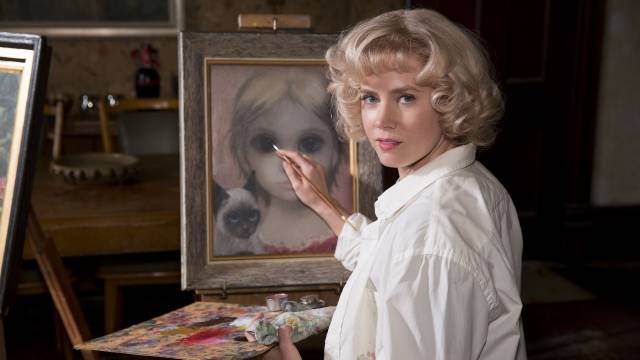
 Let’s not kid ourselves, Tim Burton’s Big Eyes has very little value as a film worthy of the filmmaker’s talents. When Burton wants to, he can be absolutely brilliant as he proved with his inventive Batman Returns, his gothic romance Edward Scissorhands and the animated duo of The Corpse Bride and Frankenweenie, other times he prefers to phone it in, ahem Planet of the Apes and Dark Shadows. Big Eyes joins the latter list, it’s a film that feels so uninspired, one can’t help but wonder if the lack of enthusiasm was his point. Although trying to claim the film has any intentions of going beyond what it does, would be too much praise.
Let’s not kid ourselves, Tim Burton’s Big Eyes has very little value as a film worthy of the filmmaker’s talents. When Burton wants to, he can be absolutely brilliant as he proved with his inventive Batman Returns, his gothic romance Edward Scissorhands and the animated duo of The Corpse Bride and Frankenweenie, other times he prefers to phone it in, ahem Planet of the Apes and Dark Shadows. Big Eyes joins the latter list, it’s a film that feels so uninspired, one can’t help but wonder if the lack of enthusiasm was his point. Although trying to claim the film has any intentions of going beyond what it does, would be too much praise.
Based on the real life story of artist Margaret Keane (Amy Adams), the plot centers on her destructive relationship with her husband Walter (Christoph Waltz) who for almost two decades fooled the world by claiming he was the author of the big-eyed portraits his wife was painting, and which were making him rich beyond his dreams. Partly scared because she had just escaped another abusive marriage, Margaret gives in to Walter’s demands and his emotional torture, but fortunately the film has a happy ending, as Margaret decides she needs to take matters into judicial hands and sues him.
One would think Keane’s aesthetics would have served as inspiration to Burton’s visual style, but instead of letting her artwork influence the film’s look, the “big eyes” outside the paintings are reserved for a predictable sequence in which Margaret is tormented by the very beings she created. If anything the film is a showcase for Adams to display her immense talents - we’re better off ignoring Waltz who turns in a performance that confuses scenery chewing with amateur crassness - and if there is any value in the film, it’s owed to Adams’ performance, for despite the film’s efforts to turn her into a biopic stereotype, she tries to dig deeper and reach Margaret’s core.
It’s also important, and almost inevitable, to wonder if Adams decided to star in the film because of how much the character of Margaret Keane seems to represent the way in which her career is perceived. In less than a decade Adams has gone on to become one of the most ubiquitous presences in film, having accumulated a total of five Academy Award nominations in eight years and constantly being in the run for some of the most coveted parts in the industry. Adams however isn’t a “movie star”, she’s a working actress who has carved a place for herself not with charming red carpet appearances or interviews that go viral, instead she has earned recognition exclusively for her work.
In Big Eyes she plays a woman who is constantly told that in order to sell her art she first has to learn how to sell herself and charm audiences with her wit and humor. Margaret, like Amy, has none of this, so in a way, despite the film’s many shortcomings, Adams ends up becoming its auteur in a way, for it’s only through her exquisite work that we’re able to realize that the film’s real issue isn’t the way Margaret was cheated or the eventual trial which turns into a media spectacle, the real question being asked in Big Eyes is why isn’t art enough? Why does an artist need salesmanship to make it work? It’s a shame that Adams didn’t have a better film on which to peg this truly essential question, because in the midst of awards season it truly should be something we find ourselves discussing more thoroughly.